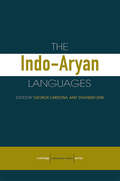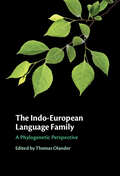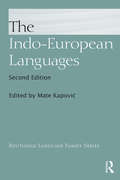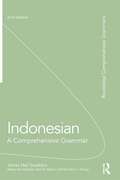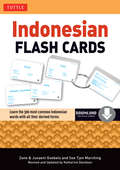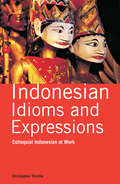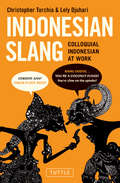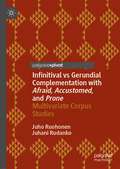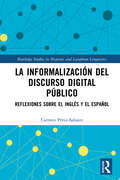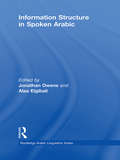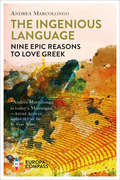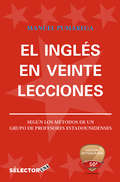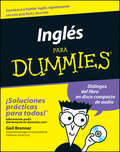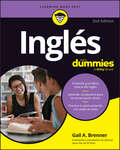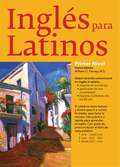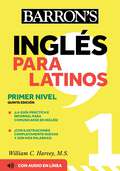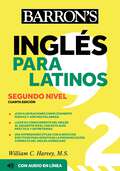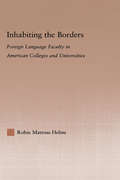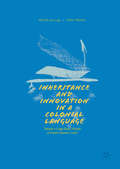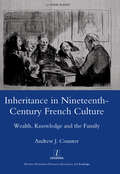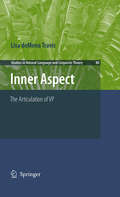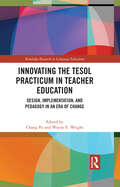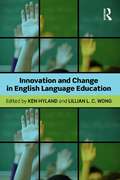- Table View
- List View
The Indo-Aryan Languages (Routledge Language Family Ser.)
by Danesh Jain George CardonaThe Indo-Aryan languages are spoken by at least 700 million people throughout India, Pakistan, Bangladesh, Nepal, Sri Lanka and the Maldive Islands. They have a claim to great antiquity, with the earliest Vedic Sanskrit texts dating to the end of the second millennium B.C. With texts in Old Indo-Aryan, Middle Indo-Aryan and Modern Indo-Aryan, this language family supplies a historical documentation of language change over a longer period than any other subgroup of Indo-European. This volume is divided into two main sections dealing with general matters and individual languages. Each chapter on the individual language covers the phonology and grammar (morphology and syntax) of the language and its writing system, and gives the historical background and information concerning the geography of the language and the number of its speakers.
The Indo-European Controversy
by Pereltsvaig, Asya and Lewis, Martin W. Asya Pereltsvaig Martin W. LewisOver the past decade, a group of prolific and innovative evolutionary biologists has sought to reinvent historical linguistics through the use of phylogenetic and phylogeographical analysis, treating cognates like genes and conceptualizing the spread of languages in terms of the diffusion of viruses. Using these techniques, researchers claim to have located the origin of the Indo-European language family in Neolithic Anatolia, challenging the near-consensus view that it emerged in the grasslands north of the Black Sea thousands of years later. But despite its widespread celebration in the global media, this new approach fails to withstand scrutiny. As languages do not evolve like biological species and do not spread like viruses, the model produces incoherent results, contradicted by the empirical record at every turn. This book asserts that the origin and spread of languages must be examined primarily through the time-tested techniques of linguistic analysis, rather than those of evolutionary biology.
The Indo-European Language Family: A Phylogenetic Perspective
by Thomas OlanderModern languages like English, Spanish, Russian and Hindi as well as ancient languages like Greek, Latin and Sanskrit all belong to the Indo-European language family, which means that they all descend from a common ancestor. But how, more precisely, are the Indo-European languages related to each other? This book brings together pioneering research from a team of international scholars to address this fundamental question. It provides an introduction to linguistic subgrouping as well as offering comprehensive, systematic and up-to-date analyses of the ten main branches of the Indo-European language family: Anatolian, Tocharian, Italic, Celtic, Germanic, Greek, Armenian, Albanian, Indo-Iranian and Balto-Slavic. By highlighting that these branches are saliently different from each other, yet at the same time display striking similarities, the book demonstrates the early diversification of the Indo-European language family, spoken today by half the world's population. This title is also available as open access on Cambridge Core.
The Indo-European Languages
by Mate Kapovi 263 Anna Giacalone Ramat Paolo RamatThe Indo-European Languages presents a comprehensive survey of the individual languages and language subgroups within this language family. With over four hundred languages and dialects and almost three billion native speakers, the Indo-European language family is the largest of the recognized language groups and includes most of the major current languages of Europe, the Iranian plateau and the Indian subcontinent. Written by an international team of experts, this comprehensive, single-volume tome presents in-depth discussions of the historical development and specialized linguistic features of the Indo-European languages. This unique resource remains the ideal reference for advanced undergraduate and postgraduate students of Indo-European linguistics and languages, but also for more experienced researchers looking for an up-to-date survey of separate Indo-European branches. It will be of interest to researchers and anyone with an interest in historical linguistics, linguistic anthropology and language development.
Indonesian: A Comprehensive Grammar (Routledge Comprehensive Grammars)
by James Neil Sneddon K Alexander Adelaar Dwi N. Djenar Michael EwingThis grammar is a complete reference guide to the language of Indonesia as used by native speakers. The book is organised to promote a thorough understanding of Indonesian grammar. It presents the complexities of Indonesian in a concise and readable form. An extensive index, cross-referencing and a generous use of headings will provide readers with immediate access to the information they require. Key features: to aid clarity, all word groups and structures discussed are illustrated by natural examples of frequently used words and expressions each section can be read independently, enabling the reader to focus on a specific aspect of the language, if required all major structures of Indonesian, from words to complex sentences are described in detail common grammatical terms used are all clearly defined in an extensive glossary. By providing a comprehensive description of Indonesian in a clear and non-technical manner, this grammar makes an ideal reference source for all users of the language, whether in colleges, universities or adult education classes of all types. James Neil Sneddon was Associate Professor in the Faculty of Asian and International Studies at Griffith University, with long experience teaching Indonesian language and linguistics. He is also author of Understanding Indonesian Grammar. Alexander Adelaar is Principal Fellow in the Asia Institute at the University of Melbourne. He is author of a number of books on Austronesian linguistics. Dwi Noverini Djenar lectures in the Department of Indonesian Studies at the University of Sydney. She is author of Semantic, Pragmatic and Discourse Perspectives of Preposition Use: A study of Indonesian locatives. Michael C Ewing is a senior lecturer in Indonesian Studies at the Asia Institute at the University of Melbourne. He is author of Grammar and Inference in Conversation: Identifying clause structure in spoken Javanese.
Indonesian Flash Cards
by Soe Tjen Marching Zane Goebel Junaeni GoebelIndonesian Flash Cards is an excellent new Indonesian language learning resource for beginning students of Indonesian.Before heading out to Bali, the best way to learn Indonesian is to start practicing with these flashcards and give a boost to your Indonesian language skills. Since Indonesian uses a romanized alphabet, you can read Indonesian without learning a new alphabet or special characters. Each card features definitions, related words, sample sentences, and thematic grouping. This flash cards ebook contains: 300 flash cards featuring the most commonly used words. Native speaker audio recordings of 1,200+ Indonesian words and phrases. A 32 page study booklet with sorting indexes and practice tips. Each card has one main vocabulary item and several derived words. Ideal for beginning students of Indonesian and anyone living in the country.These Indonesian flashcards are an excellent way of gradually increasing your Indonesian vocabulary. Their compact format makes them easy to carry around with you as you go about your regular routine, and you can make use of any spare minutes throughout the day to test yourself or take the next step in your Indonesian language learning. The key to building a working vocabulary is frequent exposure rather than prolonged study sessions, and with these flash cards it is easy to make good use of any odd minutes that would otherwise be wasted-on the bus, standing in line, or over a cup of coffee.
Indonesian Idioms and Expressions
by Christopher Torchia Lely DjuhariIndonesian Idioms and Expressions is a collection of Indonesian expressions, including proverbs, slang, quotations and acronyms, that offers a commentary on their origins, as well as insights into Indonesian culture, customs, and history. The book is an informal compendium designed to be both educational and easy to read. There are four parts in the book, and the chapters hit on various linguistic themes, among them wisdom, characters, animals, food, slang, family affairs, and politics. Entries include the expression in Bahasa Indonesia, a translation, an equivalent expression in English, and an explanation if necessary. The idea is to learn about Indonesian through the texture and content of its language, rather than the headlines-often bad ones-that tend to dominate perceptions of the vast country.
Indonesian Slang
by Christopher Torchia Lely DjuhariCekidot, gan!-"Check it out Boss!"Kamu Dodol-"You're a coconut fudge!" (You're slow on the uptake)This book is an informal compendium of Indonesian expressions, including proverbs, slang, quotations and acronyms.The unique aspects of the Indonesian language offer one of the best windows into Indonesian culture. Slang, titles, proverbs, nicknames, acronyms, quotations and other expressions reveal its character, in the words of its people. This book of expressions looks at Indonesia with the help of its national language, bahasa Indonesia. It describes Indonesians and their fears, beliefs, history and politics, as well as how they live, fight, grieve and laugh. Indonesian is a variant of Malay, the national language of Malaysia, and many of its expressions come from the Malay heartland of Sumatra island. Indonesian has also incorporated terms from Javanese, the language of the dominant ethnic group in a huge nation of more than 17,000 islands. Although Indonesian is officially a young language, it contains words from Sanskrit, Arabic, Chinese, Dutch, Portuguese and English, a legacy of the merchants, warriors, laborers and holy men who traveled to the archipelago over the centuries. The Indonesian language was a nationalist symbol during the campaign against Dutch rule in the 20th century.
Indonesian Slang
by Christopher Torchia Lely DjuhariCekidot, gan!-"Check it out Boss!"Kamu Dodol-"You're a coconut fudge!" (You're slow on the uptake)This book is an informal compendium of Indonesian expressions, including proverbs, slang, quotations and acronyms.The unique aspects of the Indonesian language offer one of the best windows into Indonesian culture. Slang, titles, proverbs, nicknames, acronyms, quotations and other expressions reveal its character, in the words of its people. This book of expressions looks at Indonesia with the help of its national language, bahasa Indonesia. It describes Indonesians and their fears, beliefs, history and politics, as well as how they live, fight, grieve and laugh. Indonesian is a variant of Malay, the national language of Malaysia, and many of its expressions come from the Malay heartland of Sumatra island. Indonesian has also incorporated terms from Javanese, the language of the dominant ethnic group in a huge nation of more than 17,000 islands. Although Indonesian is officially a young language, it contains words from Sanskrit, Arabic, Chinese, Dutch, Portuguese and English, a legacy of the merchants, warriors, laborers and holy men who traveled to the archipelago over the centuries. The Indonesian language was a nationalist symbol during the campaign against Dutch rule in the 20th century.
Infinitival vs Gerundial Complementation with Afraid, Accustomed, and Prone: Multivariate Corpus Studies
by Juho Ruohonen Juhani RudankoThis book explores the concept of complementation in the adjectival domain of English grammar. Alternation between non-finite complements, especially to infinitives and gerundial complements, has been investigated intensively on the basis of large corpora in the last few years. With very few exceptions, however, such work has hitherto been based on univariate analysis methods. Using multivariate analysis, the authors present methodologically innovative case studies examining a large array of explanatory factors potentially impacting complement choice in cases of alternation. This approach yields more precise information on the impact of each factor on complement choice as well as on interactions between different explanatory factors. The book thus presents a methodologically new perspective on the study of the system of non-finite complementation in recent English and variation within that system, and will be relevant to academics and students with an interest in English grammar, predicate complementation, and statistical approaches to language.
La informalización del discurso digital público: Reflexiones sobre el inglés y el español (Routledge Studies in Hispanic and Lusophone Linguistics)
by Carmen Pérez-SabaterLa informalización del discurso digital público is an innovative volume which examines different communicative practices which take place on social media and justifies the shift towards more informal/oral styles of public communication in English and Spanish.The book takes a first step in understanding and analysing how the use of code-switching, language preference, and graphicons contribute to the public image of institutions, politicians and celebrities, as well as how the aforementioned strategies fit into the negotiation of the norms and identities of public communities on social media platforms. Offering an updated approach to studying digital discourse in public contexts, it is the first of its kind written in Spanish. The volume focuses on the characteristic linguistic features associated with digital communication and informal oral writing styles, such as reduplication of vowels, consonants, acronyms, and shortenings, code-switching and language preference, and the insertion of multimodal and graphical elements.A comprehensive and unique volume, La informalización del discurso digital público is ideal for researchers and postgraduate students interested in digital discourse, sociolinguistics, and media studies.La informalización del discurso digital público es un volumen innovador que examina diferentes prácticas comunicativas que tienen lugar en las redes sociales con el fin de justificar el cambio hacia estilos más informales/orales de comunicación pública en inglés y en español.El libro ofrece un punto de vista novedoso sobre la contribución del cambio de código, la elección de lengua y los graficonos a la imagen pública de instituciones, políticos y celebridades; así como la repercusión que las estrategias mencionadas tienen en la negociación de las normas e identidades de las comunidades públicas en redes sociales. Ofrece un enfoque actualizado del estudio del discurso digital en contextos públicos y es el primero de este tipo escrito en español. El volumen se centra en los rasgos lingüísticos característicos de la comunicación digital y de los estilos de escritura oral informal, tales como la reduplicación de vocales, consonantes, acrónimos y abreviaturas, el cambio de código y la preferencia de lengua, así como la inserción de elementos multimodales y gráficos.La informalización del discurso digital público es un volumen completo y único, ideal para investigadores y estudiantes de posgrado interesados en el discurso digital, la sociolingüística y los estudios sobre los medios de comunicación.
Information Structure in Spoken Arabic (Routledge Arabic Linguistics Series)
by Jonathan OwensThis book explores speakers’ intentions, and the structural and pragmatic resources they employ, in spoken Arabic – which is different in many essential respects from literary Arabic. Based on new empirical findings from across the Arabic world this book elucidates the many ways in which context and the goals and intentions of the speaker inform and constrain linguistic structure in spoken Arabic. This is the first book to provide an in-depth analysis of information structure in spoken Arabic, which is based on language as it is actually used, not on normatively-given grammar. Written by leading experts in Arabic linguistics, the studies evaluate the ways in which relevant parts of a message in spoken Arabic are encoded, highlighted or obscured. It covers a broad range of issues from across the Arabic-speaking world, including the discourse-sensitive properties of word order variation, the use of intonation for information focussing, the differential role of native Arabic and second languages to encode information in a codeswitching context, and the need for cultural contextualization to understand the role of "disinformation" structure. The studies combine a strong empirical basis with methodological and theoretical issues drawn from a number of different perspectives including pragmatic theory, language contact, instrumental prosodic analysis and (de-)grammaticalization theory. The introductory chapter embeds the project within the deeper Arabic grammatical tradition, as elaborated by the eleventh century grammarian Abdul Qahir al-Jurjani. This book provides an invaluable comprehensive introduction to an important, yet understudied, component of spoken Arabic.
The Ingenious Language: Nine Epic Reasons to Love Greek
by Andrea MarcolongoAn Italian journalist pleads her case for learning ancient Greek in modern times. For word nerds, language loons, and grammar geeks, an impassioned and informative literary leap into the wonders of the Greek language. Here are nine ways Greek can transform your relationship to time and to those around you, nine reflections on the language of Sappho, Plato, and Thucydides, and its relevance to our lives today, nine chapters that will leave readers with a new passion for a very old language, nine epic reasons to love Greek.The Ingenious Language is a love song dedicated to the language of history&’s greatest poets, philosophers, adventurers, lovers, adulterers, and generals. Greek, as Marcolongo explains in her buoyant and entertaining prose, is unsurpassed in its beauty and expressivity, but it can also offer us new ways of seeing the world and our place in it. She takes readers on an astonishing journey, at the end of which, while it may still be Greek to you, you&’ll have nine reasons to be glad it is. No batteries or prior knowledge of Greek required!Praise for The Ingenious Language&“Andrea Marcolongo is today&’s Montaigne. She possesses an amazing familiarity with the classics combined with the ease and lightness of those who surf the web.&” —André Aciman, New York Times–bestselling author of Find Me&“[Marcolongo&’s] declaration of love for Ancient Greek does more than celebrate the virtues of its grammar, it shows us modern fools how this language can help us understand ourselves better and live a better life.&” —Le Monde (France)
El Inglés en veinte lecciones
by Manuel PumaregaEl inglés en veinte lecciones es el método que ha permitido a miles y miles de personas dominar el idioma inglés sin necesidad de un maestro. A diferencia de otras obras del género, El inglés en veinte lecciones le proporciona una enseñanza clara y lógica, con lecciones que profundizan en la lengua a medida que usted avanza. Además, esta obra le ofrece los elementos fundamentales de la conversación y multitud de diálogos cotidianos para que usted practique el idioma desde el principio. El inglés en veinte lecciones es un método sencillo y práctico. Compruébelo: sin necesidad de un maestro usted puede dominar el inglés en muy corto tiempo.
Inglés Para Dummies
by Gail BrennerLa guía más efectiva de inglés básico para hablantes nativos de español Ingles Para Dummies es una guía para aprender lo más básico del idioma inglés.Esto le ayudara a ponerse al día con lecciones prácticas, ilustraciones útiles, y con una gran cantidad de ejemplos. Usted puede estudiar desde casa a su propio ritmo, es decir, la combinación perfecta. Escrito por un líder experto en del idioma inglés Lleno de tablas útiles para aprender vocabulario Ofrece sugerencias y consejos para descifrar el código de la gramática del ingles El audio disco compacto contiene conversaciones que enseñan la pronunciación correcta Este libro y disco compacto ofrecen cobertura de todo los aspectos esenciales del idioma ingles incluyendo gramática, su uso, y vocabulario que le permitira hablar inglés en al instante. ENGLISH DESCRIPTION The most effective guide to basic English for native Spanish Speakers Ingles Para Dummies is your guide for learning the basics of the English language. It will help to get you up to speed with practical lessons, helpful illustrations, and a wealth of examples. You can to study at home and at your own pace—the perfect combination. Written by a leading English language expert Filled with helpful charts for learning vocabulary Offers suggestions and tips for cracking the code of English grammar he audio CD demonstrates conversations presented and illustrates correct pronunciation This book and companion CD offers coverage of all English language essentials including grammar, usage, and vocabulary that will have you speaking English in no time. Note: CD-ROM/DVD and other supplementary materials are not included as part of eBook file.
Inglés Para Dummies
by Gail BrennerEs fácil aprender inglés, lo prometemos Ingles Para Dummies está repleto de explicaciones claras de la gramática, el uso, la jerga y más en inglés, todo en un formato fácil de seguir. Estudia a su propio ritmo, en la comodidad de su hogar, con esta guía imprescindible para cualquier persona que quiera aprender inglés. Le encantará el útil mini diccionario inglés-español mientras aprende la jerga para saludos personales, conversaciones telefónicas, compras, viajes, cenas y otras actividades diarias. Además, los ejemplos del mundo real te permiten poner en práctica sus nuevas habilidades. Con ayuda de pronunciación, consejos y trucos, y errores comunes para evitar, Ingles Para Dummies tiene todo lo que necesitas para usar el inglés con confianza. Aprende la gramática básica del inglés y las expresiones importantes del día a día Practica tu pronunciación y evita errores comunes Domina frases útiles para el hogar, el trabajo, la salud y la recreación Usa atajos prácticos y jerga auténtica para una conversación fácil y divertidaLos hispanohablantes que recién comienzan con el inglés pueden aprender rápida y fácilmente vocabulario básico, gramática y habilidades de conversación, además de mejorar la confianza para hablar y manejar situaciones cotidianas, gracias a este divertido libro Dummies.
Ingles Para Latinos-Level 1, 4th edition
by William C. HarveyINGLES PARA LATINOS LEVEL 1 is designed to teach Hispanics in the United States and Canada a practical working knowledge of English. Updated with additional commonly-used phrases, new questions and answers for practice and review, and listening aids such as find-the-word boxes, jumbled words, and crosswords, the new edition of this informal language-learning program has been created to give Hispanics in the United States and Canada a practical working knowledge of English. Author William Harvey bypasses the dull rules of grammar, and instead familiarizes readers with often-used phrases, including a series of informal conversations among speakers in idiomatic American English. It also features tables that present commonly-used English verbs and verb tenses. Emphasis on correct pronunciation includes helpful tips and advice on pronunciation and listening comprehension. The supplemental downloadable audio uses spoken dialogues and coaching to emphasize correct pronunciation of informal American English.
Ingles Para Latinos, Level 1 + Online Audio (Barron's Foreign Language Guides)
by William C. HarveyDiseñado para enseñar a los hispanos en los Estados Unidos y Canadá un conocimiento práctico del inglés. Actualizada con frases adicionales de uso común, nuevas preguntas y respuestas para la práctica y la revisión, y ayudas para la escucha como cajas de búsqueda de la palabra, palabras mezcladas y crucigramas, la nueva edición de este programa informal de aprendizaje de idiomas se ha creado para dar a los hispanos en los Estados Unidos y Canadá un conocimiento práctico del inglés. El autor William Harvey evita las reglas aburridas de la gramática, y en su lugar familiariza a los lectores con frases usadas a menudo, incluyendo una serie de conversaciones informales entre los hablantes en inglés estadounidense idiomático. También presenta tablas que presentan verbos y tiempos de verbos en inglés de uso común. El énfasis en la pronunciación correcta incluye consejos útiles y consejos sobre la pronunciación y la comprensión auditiva. El audio en línea utiliza diálogos hablados y entrenamiento para enfatizar la pronunciación correcta del inglés estadounidense informal. Publisher's Note: Products purchased from Third Party sellers are not guaranteed by the publisher for quality, authenticity, or access to any online entities included with the product.Designed to teach Hispanics in the United States and Canada a practical working knowledge of English. Updated with additional commonly-used phrases, new questions and answers for practice and review, and listening aids such as find-the-word boxes, jumbled words, and crosswords, the new edition of this informal language-learning program has been created to give Hispanics in the United States and Canada a practical working knowledge of English. Author William Harvey bypasses the dull rules of grammar, and instead familiarizes readers with often-used phrases, including a series of informal conversations among speakers in idiomatic American English. It also features tables that present commonly-used English verbs and verb tenses. Emphasis on correct pronunciation includes helpful tips and advice on pronunciation and listening comprehension. The online audio uses spoken dialogues and coaching to emphasize correct pronunciation of informal American English.
Ingles Para Latinos, Level 2 + Online Audio (Barron's Foreign Language Guides)
by William C. HarveyEste programa de idiomas de nivel intermedio ampliado y actualizado está diseñado para ayudar a los hispanohablantes a adquirir un dominio del inglés estadounidense. Es una guía de seguimiento y autodidacta ideal para los hispanos que han dominado el programa Inglés para Latinos, Nivel 1, pero también puede ser útil para cualquier persona que ya tiene algún conocimiento básico de inglés. El audio en línea utiliza diálogos hablados y entrenamiento para enfatizar la pronunciación correcta del inglés estadounidense informal.Publisher's Note: Products purchased from Third Party sellers are not guaranteed by the publisher for quality, authenticity, or access to any online entities included with the product.This expanded and updated intermediate-level language program is designed to help Spanish speakers gain proficiency in American English. It is an ideal follow-up and self-teaching guide for Hispanics who have mastered Barron's Inglés para Latinos, Level 1, but it can also be helpful to anyone who already has some basic knowledge of English. The online audio uses spoken dialogues and coaching to emphasize correct pronunciation of informal American English.
Inhabiting the Borders: Foreign Language Faculty in American Colleges and Universities (Studies in Higher Education)
by Robin Matross HelmsThis book focuses on the experience of foreign language faculty in American colleges and universities, the challenges they face, and ways that academia can better support language faculty, and marginalized faculty in other fields, in their important work.
Inheritance and Innovation in a Colonial Language
by William Jennings Stefan PfänderThis book takes a fresh approach to analysing how new languages are created, combining in-depth colonial history and empirical, usage-based linguistics. Focusing on a rarely studied language, the authors employ this dual methodology to reconstruct how multilingual individuals drew on their perception of Romance and West African languages to form French Guianese Creole. In doing so, they facilitate the application of a usage-based approach to language while simultaneously contributing significantly to the debate on creole origins. This innovative volume is sure to appeal to students and scholars of language history, creolisation and languages in contact. Chapter 3 is published open access under a CC BY 4. 0 license.
Inheritance in Nineteenth-century French Culture: Wealth, Knowledge and the Family
by AndrewJ. CounterThe transmission of wealth between generations was not only a narrative commonplace in nineteenth-century France, but also a topic of considerable cultural anxiety and intense political debate. In this study, Andrew J. Counter draws on a wealth of previously unexplored material to show how the theme of inheritance in literature and beyond acquired ethical, historical and ideological connotations, and was vital to nineteenth-century French conceptions of the family and of the legacy of the Revolution. Weaving together fiction, drama, legal texts, historiographical thought and political writing, Inheritance in Nineteenth-Century French Culture teases out a complex leitmotiv that gives us a new understanding of nineteenth- century Frances sense of its own place in history. It also proposes innovative readings of writers as familiar as Honore de Balzac, George Sand, Guy de Maupassant and Emile Zola, while drawing attention to a range of neglected authors and works.
Inner Aspect
by Lisa Demena TravisThis monograph probes the structure of the verb phrase through a cross-linguistic investigation of the syntax and morphology of relevant constructions. Evidence is provided for two event-related non-lexical projections called "inner aspect" and "event".
Innovating the TESOL Practicum in Teacher Education: Design, Implementation, and Pedagogy in an Era of Change (Routledge Research in Language Education)
by Chang PuRecognizing new opportunities and challenges brought about by technological and social change, as well as the COVID-19 pandemic, this volume explores innovative design, implementation, and pedagogy for practica experiences in teacher education programs in the field of Teaching English to Speakers of Other Languages. By showcasing research and practice undertaken in a range of teacher education courses and programs, the volume offers evidence-based approaches to enhancing pre- and in-service teachers’ learning and cultural awareness. Chapters come together coherently to address issues and explore innovative structures revolving around high-quality TESOL practica. Particular attention is paid to emerging opportunities offered by virtual and simulated learning in online and in-person practica, as well as potential changes to best practice in community-based programs. Using a diverse set of lenses to examine the practical, theoretical, and methodological aspects of TESOL practica, this volume will be of interest to students, scholars and researchers with an interest in TESOL education, as well as in open and distance education.
Innovation and change in English language education
by Ken Hyland Lillian L. C. WongQuestions about what to teach and how best to teach it are what drive professional practice in the English language classroom. Innovation and change in English language education addresses these key questions so that teachers are able to understand and manage change to organise teaching and learning more effectively. The book provides an accessible introduction to current theory and research in innovation and change in ELT and shows how these understandings have been applied to the practical concerns of the curriculum and the classroom. In specially commissioned chapters written by experts in the field, the volume sets out the key issues in innovation and change and shows how these relate to actual practice offers a guide to innovation and change in key areas grounded in research relates theory to practice through the use of illustrative case studies and examples brings together the very best scholarship in TESOL and language education from around the world This book will be of interest to upper undergraduate and graduate students in applied linguistics, language education and TESOL as well as pre-service and in-service teachers, teacher educators, researchers and administrators keen to create and manage teaching and learning more effectively.
